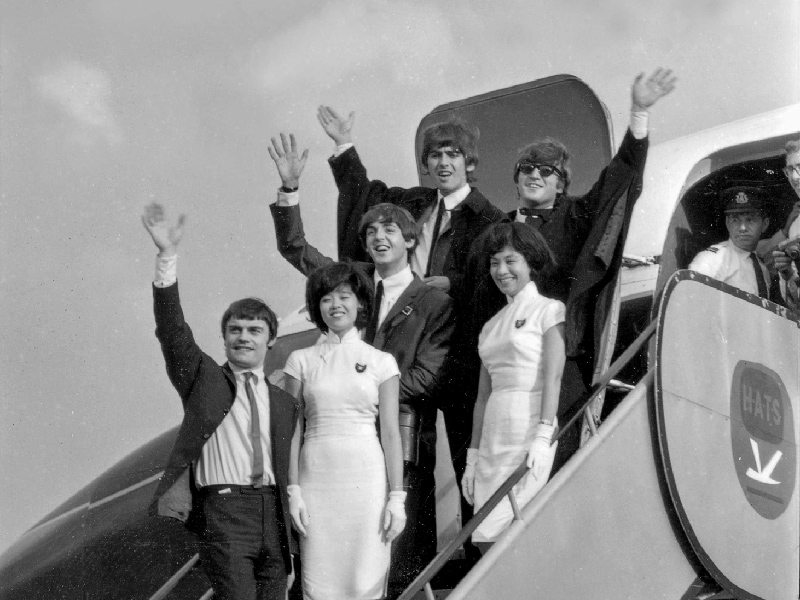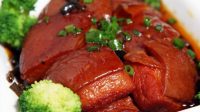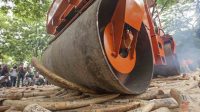Fifty years ago next year, The Beatles came to Hong Kong. June 9, 1964, has been called the most important day in Hong Kong’s pop history. In the collective memory of the city, The Beatles’ appearance at the Princess Theatre in Kowloon – today the site of the Mira Hotel – marked the beginning of an era: the era of Hong Kong English-language rock ’n’ roll, and ultimately of the Cantonese-language pop that it gave birth to.
However, when speaking to the people who were there – audience members and the movers and shakers of Hong Kong’s 1960s pop scene – a more complicated picture emerges. Have we been giving the Fab Four too much credit?
First of all, Fab Three would be more accurate: The Beatles who appeared in Hong Kong were short one Ringo Starr, who was recovering from tonsillitis in a London hospital; he was temporarily replaced by drummer Jimmy Nicol.
Also, the commonly heard story that the Princess Theatre was packed with thousands of screaming, music-starved Hong Kong youngsters doesn’t hold up under scrutiny. The screams were real, but according to Hong Kong institution DJ Ray “Uncle Ray” Cordeiro, they most likely came from military servicemen. In fact, the concert was the only time in Beatles history where the promoter lost money. Tickets went unsold.
“It was quite a flop because the teenagers couldn’t afford to buy the tickets ... and the parents didn’t know who The Beatles were. So the theatre was empty,” Cordeiro says.
According to Cordeiro, the promoter was forced to offer the unsold tickets to the army, free of charge, and the auditorium was filled with soldiers in uniforms.
Other audience members remember things a bit differently. Anders Nelsson, then a teenager and lead singer of the band The Kontinentals, and Philip Chan Yan- kin of the Astro-Notes, clearly remember throngs of screaming female fans. Nelsson recalls barely being able to make out the music, “the girls were screaming so loud and the PA system was so bad that it was basically an experience rather than a concert”.
Regardless of the band’s reception, all three witnesses believe the idea that The Beatles’ appearance in Hong Kong launched the local pop scene is flawed.
Cordeiro thinks someone else entirely was responsible for Hong Kong’s pop boom: himself. “I’m proud to say I’m the one who initiated the pop scene in Hong Konginthe’60s...Iwaskingofthe pop scene in Hong Kong,” he says.
He might be right. Through his radio show on what was then RHK, Cordeiro was introducing Hong Kong listeners to Western, mostly British, pop and rock ’n’ roll music long before The Beatles arrived. The musicians who would come to define the ’60s musical landscape here, such as Teddy Robin of Teddy Robin and the Playboys, Joe Junior of Joe Junior and the Side Effects, Chan and Nelsson all agree they were listening to and playing English-language pop music before The Beatles touched down at Kai Tak airport. And as soon as the young bands recorded a new single, Cordeiro was there to put it on the air.
Nelsson, whose band is commonly credited with producing the first English-language pop records in Hong Kong, admits The Beatles concert “sparked off a boom in more bands” but he says, “it wasn’t that there were no bands before The Beatles came”.
Also, there was a matter of taste. Robin says his band The Playboys were called “The Beatles of Hong Kong” and boasts that “The Playboys played more than 30 Beatles songs, probably over 40”.
But if Robin is the self-described “wild man” of 1960s Hong Kong pop, then Joe Junior was what Chan describes as “the well-behaved school boy”. Joe was more representative of the Hong Kong listening public. He loved The Beatles and sings their songs to this day, but his preferences, and those of a large portion of Hong Kong’s music lovers, were slanted towards straightforward love songs and tamer performers such as Pat Boone.
The 1964 concert represented perfect timing: The Beatles were at their poppiest and most accessible, just as Hong Kong was most open to new sounds. But for many Hongkongers the love affair was short-lived.
As The Beatles became more psychedelic, experimental and non- conformist, both the listening public and the young musicians had trouble keeping up.
Chan remembers trying to play The Beatles’ later hits. “There came a time we couldn’t follow the development of The Beatles as they got more sophisticated. I think we got as far as Eight Days a Week and I’ll Follow the Sun, but as they got into the psychedelic stuff, and Lucy in the Sky with Diamonds, we just had to give up.”
And also – to put it bluntly – without the right drugs, Hong Kong struggled to relate to what groups such as The Beatles were saying. “I don’t think young people here could identify that much with psychedelic music. We would drink ourselves blind but that’s all,” Chan says.
Nelsson agrees: “Hong Kong never really got into that whole drug scene. Flower power was a fashion statement.”
Meanwhile musicians in Hong Kong were busy blazing their own trail. By the late 1960s, Hong Kong’s English-language musicians were facing competition from an unexpected source: Mandarin singers from Taiwan. Nelsson remembers one specific instance in 1970 when he knew the days of English-language pop were numbered: “I was playing in a club with a band and we started off playing English and then the boss started telling us to back singers they brought in to sing in Mandarin.”
The Mando-pop craze gave way in the early 1970s and for a brief period, English-language music was ascendant again, but by this time many of the classic groups had broken up and it wasn’t long before everything changed again – this time for good. Sam Hui Koon-kit, who had gained fame with his ’60s English-language band The Lotus, started producing music in Cantonese for his brother Michael Hui Koon-man’s films. The films and their soundtracks were surprise hits. Hui, who became known as the God of Song, had given birth to Canto-pop and there would never be a real market for home-grown English-language music in Hong Kong again.
So if the idea that The Beatles’ concert ultimately gave rise to Canto-pop at the very least lacks nuance, what was the real impact of the show in Hong Kong? The consensus seems to be that, like so many things, it all comes down to sex. Sex and hair.
Chan remembers fondly: “From the first chord we couldn’t hear a thing because of the girls; they were screaming like in a horror flick. We’d seen that in the news reels, but to be there and see these short little Chinese girls and Western girls – That made me want to be a pop singer.”
Before The Beatles concert, most teenagers in bands in Hong Kong focused on their music. But the Fab Four showed Nelsson and his peers that the power of rock ’n’ roll came from more than perfectly executed scales: “[We realised] that if you grew your hair longer and you shook your head and went ‘woo’, the girls would scream,” he says.
This was a revelation to Nelsson. “Before, we just played and we were fairly serious about our playing. We hadn’t realised that you could make girls faint.” Like teenage boys in bands all over Hong Kong, he wanted to have that effect on girls, and now thanks to The Beatles they all knew how. “All of us started growing our hair and trying to do things to make the girls squeal.”
The concert also had a more practical impact on the music business in Hong Kong. Nelsson says that after The Beatles show, demand for new rock ’n’ roll records exploded. Not only was that good news for local bands, but it also got the notice of record companies and distributers overseas. “More records were brought in and they were brought in faster, finally flown in rather than brought in by boat. There was a phenomenon happening,” Nelsson says.
And it didn’t stop at records. The concert effectively opened the gates for a string of popular Western acts to perform live in Hong Kong. “The Beatles concert brought Hong Kong closer to the world of international pop music,” says Chan. “Hong Kong’s young people got exposed to all these concerts. The Carpenters came, Herman’s Hermits, Peter, Paul and Mary, everyone who was popular came – except for The Rolling Stones, who came much later.”
As the 50th anniversary of The Beatles’ appearance in the city looms, thoughts drift back to the golden age of Hong Kong pop. But, like all golden ages, those who were there know the reality was less golden than the fantasy. When Robin thinks back, he says what he remembers most is that “it was tough to be a musician in the ’60s. We were all students, you know? My parents didn’t like it. Only the people from our generation enjoyed it. There was no money even though we were so popular.”
Even so, one thing they can all look back fondly on is the music that made it all possible, of which The Beatles were only one small – albeit important – part.

Half a century ago, The Beatles brought Hong Kong closer to the world of global music, but the gig’s importance has been exaggerated over the years


